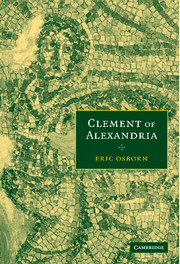Book contents
- Frontmatter
- Contents
- Preface
- List of abbreviations
- 1 Life and works
- PART I DIVINE PLAN/ECONOMY
- PART II DIVINE RECIPROCITY
- PART III FAITH AND SALVATION
- 7 The Spark and ferment of faith (exc 1.1.3)
- 8 Arguments for faith
- 9 Knowledge, sciences and philosophy
- 10 Church and heresy
- 11 Twofold hope
- 12 Love and reciprocity
- Conclusion
- Appendix: Irenaeus and Clement
- Select Bibliography
- Subject index
- Citations from Clement
- Citations from the Bible
- Citations from ancient authors
10 - Church and heresy
Published online by Cambridge University Press: 06 July 2010
- Frontmatter
- Contents
- Preface
- List of abbreviations
- 1 Life and works
- PART I DIVINE PLAN/ECONOMY
- PART II DIVINE RECIPROCITY
- PART III FAITH AND SALVATION
- 7 The Spark and ferment of faith (exc 1.1.3)
- 8 Arguments for faith
- 9 Knowledge, sciences and philosophy
- 10 Church and heresy
- 11 Twofold hope
- 12 Love and reciprocity
- Conclusion
- Appendix: Irenaeus and Clement
- Select Bibliography
- Subject index
- Citations from Clement
- Citations from the Bible
- Citations from ancient authors
Summary
THE CHURCH
The whole divine economy flows into one faith and one church. The different covenants which God has made, or the one covenant which he has made at different times, spring from the will of the one God and were made through one lord. The unity of the church is composed of those whom God, before the foundation of the world, has ordained, predestined or known to be righteous. This church has priority in time and perfection in truth over against heresies which are recent and follow falsehood. Its truth comes from its origin, a beginning which precedes all else and brings together all the righteous within God's purpose. Its unity is that of God, for God is one and the lord is one; such unity which imitates the one first principle of all things is to be praised above all else. Joined by nature to the One in substance, in idea, in beginning, in excellence, the ancient and universal church is uniquely one, uniting all who under any covenant have come to know God. Its pre-eminent unity excels all else because nothing equals it and nothing is like it (7.17.107.2–6).
The one church represents the dwelling of God on earth. When God spoke to David, he pointed to the temple where he would dwell as an anticipation of the incarnation and of the church. ‘God will truly dwell on earth with men’ (2 Chron. 6:18).
- Type
- Chapter
- Information
- Clement of Alexandria , pp. 213 - 225Publisher: Cambridge University PressPrint publication year: 2005



